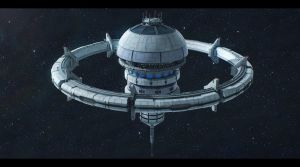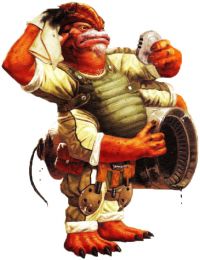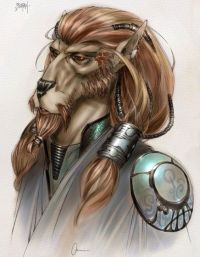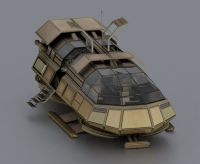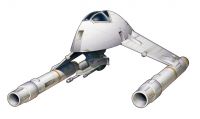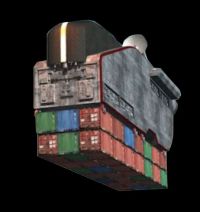Difference between revisions of "Halo Station"
| (3 intermediate revisions by the same user not shown) | |||
| Line 2: | Line 2: | ||
{{SWWorld | {{SWWorld | ||
|PlanetName=Halo Station | |PlanetName=Halo Station | ||
| − | |PlanetMap=[[Image:Halo-station | + | |PlanetMap=[[Image:Halo-station.jpg|center|300px]] |
|Region=[[SW Galaxy Core Worlds|Outer Rim]] | |Region=[[SW Galaxy Core Worlds|Outer Rim]] | ||
| − | |Sector=[[Kanz Sector]] | + | |Sector=[[Kanz Sector]] ([[Halo Frontier]]) |
|System=None | |System=None | ||
|Sun=None | |Sun=None | ||
| Line 127: | Line 127: | ||
==Station Assets== | ==Station Assets== | ||
The following are the various ships, droids, and personnel employed by the Halo Station for its own uses. There are of course any number of other people or hardware here at any given time, but these are the station's own defaults. | The following are the various ships, droids, and personnel employed by the Halo Station for its own uses. There are of course any number of other people or hardware here at any given time, but these are the station's own defaults. | ||
| + | ===Ships=== | ||
| + | {| align="none" border="0" style="background: white" | ||
| + | |||
| + | | [[Image:Starwind-shuttle.jpg|center|200px]] || '''Slayn & Kopril "Starwind"-class Runabout Shuttle'''<br>''Shuttle Fleet''<br>A civic people-mover shuttle, the Starwind can hold up to 20 passengers, and modest luggage for all of them. Though it is not hyperdrive capable, it has blazing fast sublight engines, allowing them to zip quickly to their assigned tasks. Aboard the Halo Station, the Starwinds provide commuter transport back and forth between the Bays and the Halo hangars proper. At any given time, the airspace between the station and the ring is filled with a dozen or more of these small, zippy vessels.<br><br>A few of these shuttle are instead intended for VIP transport, with much more luxurious interiors, moving between the Halo and the Crown. | ||
| + | |-style="background:gainsboro;" | ||
| + | | [[Image:Kuat-Hunter.jpg|center|200px]] || '''Kuat A-7 Hunter-Interceptor'''<br>''Station Defense Starfighter''<br>The outward-facing bays on the Halo all have several Hunter-Interceptors in upper bays, accessible through dedicated pilot-only walkways above the commuter bays. In case of an attack, all commuter traffic is locked down to give room for these defensive starfighters to launch. | ||
| + | |- | ||
| + | | [[Image:Cargo-drone.jpg|center|200px]] || '''Halo Station Cargo Drone'''<br>''Cargo Mover''<br>When Halo Station's dedicated pilots are not piloting Starwinds or Hunter-Interceptors, they are taking a shift with one of the cargo drones. Remote-piloted from a station in the Engineering Deck, these drones collect and carry large shipping containers of cargo and deliver them to the various cargo-drop points between the Ring and the Halo Station's Depots and Engineering decks. Though each drone has a very basic droid AI to handle the basics of piloting, one of the remote pilots can take control at any point, and frequently do so, maneuvering the drones around one another and getting them in place quickly and efficiently. | ||
| + | |} | ||
Latest revision as of 22:29, 13 February 2021
| Astrographical Information | |
|---|---|
| Region | Outer Rim |
| Sector | Kanz Sector (Halo Frontier) |
| System | None |
| Suns | None |
| Orbital Position | None |
| Moons | None |
| Coordinates | M-4 |
| Rotation Period | 24 standard hours |
| Orbital Period | None |
| Planetary Information | |
| Class | Artificial Habitat |
| Climate | Temperate (Life Support) |
| Atmosphere | Type I |
| Gravity | Standard |
| Primary Terrain | None |
| Societal Information | |
| Native Species | None |
| Immigrated Species | Diverse |
| Primary Language | Galactic Basic Standard |
| Government | Oligarchy (The Halo Board) |
| Population | 200,000 |
| Major Cities | None |
| Major Imports | Agricultural, raw industrial materials |
| Major Exports | Technology |
| Affiliation | Independent (nominal Imperial affiliation) |
| Mechanical Information | |
| Astrogation | Hyperspace Backwater: Located as far from hyperspace routes as it is, the Halo Station adds Hyperspace Beacon: In an attempt to mitigate the difficulties its location causes, the station maintains a hyperspace beacon, granting |
| Knowledges | None |
| Rarity Modifier | +2 |
| Other Mechanics | None |
Halo Station is many things: a trading hub, a center of culture and entertainment, a chamber of political activity, and even a would-be shadowport. The station is named for the docking ring that orbits the station, allowing ships larger than shuttled to dock and their residents to be ferried from the ring to the station proper. The station also includes a short-range hyperspace beacon that most ships intending to visit the Halo Frontier use as a plotting device in their hyperspace jumps, ensuring that nearly every arrival to the small cluster of systems comes here first.
Layout
The station's layout is listed starting with the massive Halo that orbits the spindle-like station, and then from top to bottom. The collection of station bays in the center of the spindle keeps the upper and lower sections free of most traffic.
The Halo
A ring of multi-level corridors.
- The outer edge of the ring is made up of docking facilities for larger ships, either into internal hangar bays or through docking mechanisms with larger ships. Facilities for the repair and refueling of ships lie along this outer ring, as well, usually above and below the hangars and docking ports.
- The inner edge contains shuttle hangar bays that ferry visitors from the ring to the station proper, as well as starfighter bays for the defense of the station (and room for such personnel).
- Between the two edges runs a wide, circular corridor for foot traffic. The center of this corridor is a deep trench through which run a pair of repulsorlift trains, moving from stop to stop; the trench is criss-crossed by pedestrian crossings.
The Spine
The spine is the connecting length of repulsor-lift tubes that connect the various decks of the station.
- Some of these tubes have room for a small crowd of people, with glass to allow them to watch the passage of the decks.
- Others are for industrial or military purposes, eschewing vantages for quick access and ability to move large cargos or groups of soldiers.
- They also feature offices for station security and communications hubs that keep the station functioning, centrally located to allow those who need to do so to find them quickly.
The Crown
At the top of the Spine, atop the Dome, sits the shining Crown: the shuttle bays for the station's leadership and the well-to-do.
- Standard people-carriers do not stop here: these are the hangars for those station residents who own private shuttles or fliers, or those that are maintained by the government, businesses, or other organizations.
- There are bays set aside solely for Imperial vessels as well, which include private lifts up to Imperial holdings on all the levels below this one.
- Also houses the station's traffic control station.
The Dome
A dome of glass and steel, arranged to give the upper level a clear view of the space above the station.
- It rotates so that the station has a "night" of approximately ten hours where the dome faces the Void of Chopani, a stretch seemingly devoid of stars entirely.
- The dome features the finest houses along its outer edges, and a center cluster of high-end corporate and government offices, with a garden ring between the two that is open to the public (ostensibly).
- Estates: All Aristocratic Lifestyles.
- Dome Level: Dome-to-Edge garden or pool area; servant quarters
- Above Walkway: Master suite, master office, library, other chambers
- Walkway Level: Kitchens, ballroom (dome), dining room, salon, guest rooms
- Garden Level: Lower bedrooms
The Residences
The upper class of residences, usually given to respectable residents and their families.
- All Upper Class and Middle Class Lifestyle dwellings.
- Includes a school for the residences, and full living facilities.
- Folk do not pay rent aboard the station – it is instead assigned as part of one's pay for work, with businesses, governments, and other organizations being assigned a certain number of residences, here.
- Additionally, suites may be purchased outright from the station, but otherwise those who live here do so because of their connection to a business or organization.
The Promenade
The level beneath the Dome features a wide variety of businesses, from theaters to shops to specialty boutiques.
- It is a center of entertainment as much as it is a place of commerce, with diversions and bright things to spend money on at every turn.
- A trench running down its center has a rich civic garden filled with air and water recycling plantlife. The balconies that overlook this garden and the meandering paths down to them are favorite places to see and be seen aboard the Halo.
- There are also a number of fine hotels and boarding houses on a level that overlooks the rest of the promenade, against the outer wall of the deck, where those who are visiting may rent accommodations by the night or by the year.
- There are also nightclubs and other nightlife places above the level of the hotels (many atop the hotels themselves), interconnected with walkways along the outer edge of the station's wall. Express repulsorlifts move from the "street" level up to the "party" level above, as do the repulsorlifts in many hotels.
Upper Bays
The people-mover shuttles drop off a good number of folk here, from the shuttles taken by those who can pay for the privilege (or whose station status indicates that they receive such service for free, including those who have apartments in the Residences).
- The transfers and security sweeps are quick, orderly, and polite.
- Also features a number of direct-access repulsorlifts going directly to the Promenade or Residences above, separate from the Spine proper, for the use of those with homes in the Residences, or a room in one of the Promenade hotels.
Engineering
A stack of five industrial decks.
- The station's central operations office and engineering machinery are located here, as well as the communications commands and other vital functions.
- The rest of the spaces here are dedicated to manufactory facilities, generally owned by station corporations (which are often in turn owned by outside interests).
- These levels feature cargo-shipping hangars to allow the delivery of raw materials and for the shipping of goods (mostly to station destinations, but sometimes to cargo vessels for sales elsewhere).
Lower Bays
Everyone else arriving from the Halo gets dropped off in the lower bays…eventually.
- They are large, handling huge volumes of people often packed aboard shuttles.
- Security sweeps are impersonal, brusque, and sometimes invasive.
- Features multiple direct-access repulsorlifts down to the Market or Quarters, but these are often out of order.
The Market
Where the Promenade has all the flash of high-end retail, the Market is where one goes for bare-bones goods, second-hand things, or even illegal goods.
- The Market is wall-to-wall small shops, kiosks, stalls, and stands.
- Multi-room shops are built into the outer walls of the deck, and around the Spine.
- The space between are a full-blown market-style set-up with all manner of things being bought and sold.
- Like the Promenade, the Market has a layer of rental dwellings that extend upward above the market proper, though they all tend to be cheap and dingy, and some are entirely owned by guilds or criminal groups to use as headquarters for their troops or as brothels.
- Unlike the Promenade, there is no level of nightlife above the hotels. There is, however, a labyrinth of cantinas and seedy joints to be found in the decking beneath the main level of the Market. It is possible but rarely safe to move from one establishment to another beneath the bulkhead. Access points are controlled by various factions and groups, who all have their own requirements for granting access (often simply a toll of some kind).
The Quarters
High-density dwellings for lower-class residents of the station.
- All Lower Class Lifestyles.
- The Quarters have family units and single-person cells, as well as facilities for eating and hygeine (as most of the cells do not feature full refreshers).
The Depots
The bowels of the station where trash and wastewater are sent for reclamation and disposal, and where the station's industrial warehouses are found.
- Includes a central functional core of industrial waste treatment, recycling, and blast furnaces for disposal.
- The outer circle is made up of massive warehouse spaces, which all include minor hangar access points for the delivery of goods for those warehouses.
- Many criminals have taken over abandoned spaces or have outright secured warehouses for their own uses, and many illegal establishments are built into these spaces.
- General repulsorlift access to this level is largely cut off; the intention is that only those with business in the area can get access, but the criminals have also arranged to get access codes to get down here, out of the public eye.
The Halo Board
The Halo Board is a governing body made up of some of the most influential people in the station. Many of them are oligarchs in their own right, with rich investments in the Frontier and the Station proper, whose wealth and power has made them natural fits for this board. Others are simply individuals of influence, often tied to powerful governments in the Frontier itself.
| Camyalani "The Headmistress" Berav Education Magnate A human education magnate who runs multiple academies for the wealthy. She maintains connections to good universities – notably the University of Lorrd – to give the best and brightest of her academies a bright future. | |
| Darrard Grik Associate Chariman of the Halo Station Proletariat Though often outwardly contentious and full of bluster, Darrard is very skilled at working with the powers that make up the rest of the board. Though his fellows sometimes accuse him of over-capitulation, his history in this position proves he knows what he's doing. And since his fellows keep sending him to sit at the table, they clearly know it. | |
| Kai Pers'Av Representative of the Worldseeker Corporation An elder corporate statesman, the gravelly-voiced bothan doesn't speak very often, but when he does, it is always to good effect. Despite the respect he is paid by the other board members, his conservative, staid views often make him something of an outsider in the political cliques that have formed. | |
| Kom'men Yunnbana Entertainment Magnate Charming and devious, Kom'men is one of those oligarchs that everyone wants to befriend and no one wants for an enemy. No one is as good as he at turning one side against another. He is the owner of a large media conglomerate that focuses on the Halo Frontier worlds, although it can be accessed throughout multiple sectors in the Outer Rim. He is also owner of the Void Angel, a luxury cruise liner that is based out of the Halo Frontier. | |
| Lesla Bille Vicar-Emissary of Gandria A zealot given to over-long pontification and preaching, Lesla has few friends on the board, but fewer enemies. The economic power that Gandria has at its beck and call is significant, and unlike Kobagari (their closest competitor in that arena), they do not keep their gaze turned inward. | |
| Nelaub Aronn Ambassador from Lekanton Sovereignty Ambassador Nelaub is jovial and well-liked, for all that he represents a culture whose core basis requires slavery in order to function as it does. Nelaub makes allies quickly and uses his influence to their benefit, seeming to very much go with the flow...at least until topics of slavery come up. He then quiet focusedly cashes in all the chips he is owed by others to ensure that the laws and procedures around the topic remain to Lekanton's liking. | |
| Nonis Korraay Representative of the Tiliq Mining Consortium Nonis Korraay sits on the seat allocated to Tiliq Mining Consortium aboard the Halo Station. Though born on Kobagari, Nonis does not adhere to the Masque Stricture of his people (unless visiting there, which rumors say he goes out of his way to avoid). Nonis is engaging and welcoming, promising very little but faithfully relaying the wishes of others to his superiors. | |
| Redarr Janray Representative of the Houses of Kobagari Smooth-voiced and cajoling, Representative Janray's mask is a familiar sight around the Halo Station. Though he and Nonis Korraay do not get along (as Redarr is notoriously insulting about Korraay's decision to forego the Masque Stricture), theirs is a friendly unfriendliness – which is the worst that anyone can accuse Redarr of. He is known to be great friends with several of the Houses of Kobagari, and board rumors suggest he may be the by-blow of one noble House or another. | |
| S'xaro Vice-President of Slayn & Korpil Anxious and prone to nervous ticks of all sorts, S'xaro nontheless enjoys his time out of the hive and in the company of others who accept him. Though he is empowered to do so, S'xaro almost never makes unilateral decisions that affect the Slayn & Kopril hive, preferring to confer with them first. |
Station Assets
The following are the various ships, droids, and personnel employed by the Halo Station for its own uses. There are of course any number of other people or hardware here at any given time, but these are the station's own defaults.
Ships
| Slayn & Kopril "Starwind"-class Runabout Shuttle Shuttle Fleet A civic people-mover shuttle, the Starwind can hold up to 20 passengers, and modest luggage for all of them. Though it is not hyperdrive capable, it has blazing fast sublight engines, allowing them to zip quickly to their assigned tasks. Aboard the Halo Station, the Starwinds provide commuter transport back and forth between the Bays and the Halo hangars proper. At any given time, the airspace between the station and the ring is filled with a dozen or more of these small, zippy vessels. A few of these shuttle are instead intended for VIP transport, with much more luxurious interiors, moving between the Halo and the Crown. | |
| Kuat A-7 Hunter-Interceptor Station Defense Starfighter The outward-facing bays on the Halo all have several Hunter-Interceptors in upper bays, accessible through dedicated pilot-only walkways above the commuter bays. In case of an attack, all commuter traffic is locked down to give room for these defensive starfighters to launch. | |
| Halo Station Cargo Drone Cargo Mover When Halo Station's dedicated pilots are not piloting Starwinds or Hunter-Interceptors, they are taking a shift with one of the cargo drones. Remote-piloted from a station in the Engineering Deck, these drones collect and carry large shipping containers of cargo and deliver them to the various cargo-drop points between the Ring and the Halo Station's Depots and Engineering decks. Though each drone has a very basic droid AI to handle the basics of piloting, one of the remote pilots can take control at any point, and frequently do so, maneuvering the drones around one another and getting them in place quickly and efficiently. |
